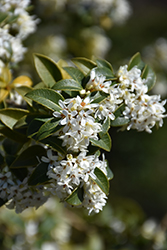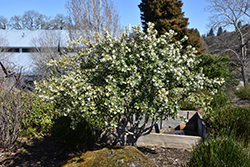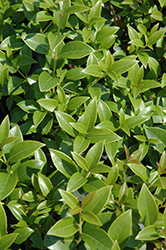It's all about ...
plants

Height: 10 feet
Spread: 10 feet
Sunlight:
![]()
![]()
Hardiness Zone: 7a
Other Names: Sweet Olive,Tea Olive, False Holly, Olive Holly
Description:
A compact evergreen shrub with small, spiny, lustrous leaves that are holly-like, but it's actually related to lilac and privet; a dense upright shrub, covered with fragrant, white trumpet flowers in spring; vigorous and adaptable
Ornamental Features
Burkwood Osmanthus is covered in stunning clusters of fragrant white tubular flowers at the ends of the branches from early to mid spring. Its attractive small spiny oval leaves emerge coppery-bronze in spring, turning lime green in colour with pointy light green spines the rest of the year.
Landscape Attributes
Burkwood Osmanthus is a dense multi-stemmed evergreen perennial with an upright spreading habit of growth. Its medium texture blends into the garden, but can always be balanced by a couple of finer or coarser plants for an effective composition.
This is a relatively low maintenance plant, and should only be pruned after flowering to avoid removing any of the current season's flowers. Deer don't particularly care for this plant and will usually leave it alone in favor of tastier treats. Gardeners should be aware of the following characteristic(s) that may warrant special consideration;
- Spiny
Burkwood Osmanthus is recommended for the following landscape applications;
- Accent
- Mass Planting
- Hedges/Screening
- General Garden Use
- Topiary
Planting & Growing
Burkwood Osmanthus will grow to be about 10 feet tall at maturity, with a spread of 10 feet. Its foliage tends to remain dense right to the ground, not requiring facer plants in front. Although it is technically a woody plant, this slow-growing plant can be expected to behave as a perennial in our climate if planted outdoors over the winter, usually regrowing from its base (crown) the following year. As such, gardeners should take into consideration that it will perform differently than it would in its native habitat.
This plant does best in full sun to partial shade. It does best in average to evenly moist conditions, but will not tolerate standing water. It is not particular as to soil pH, but grows best in rich soils. It is highly tolerant of urban pollution and will even thrive in inner city environments. This particular variety is an interspecific hybrid.
This plant is not reliably hardy in our region, and certain restrictions may apply; contact the store for more information.


